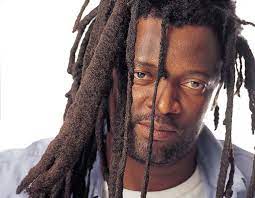
Lucky Philip Dube, born on August 3, 1964, in Ermelo, South Africa, and tragically killed on October 18, 2007, was a reggae musician and one of South Africa’s most influential and best-selling artists. His remarkable career not only left an indelible mark on the global reggae scene but also made him a voice for social consciousness and justice during the turbulent years of apartheid in South Africa.
Raised in the town of Lekazi in Mpumalanga, Dube’s early exposure to music was deeply rooted in the traditional sounds of mbaqanga, a genre native to South Africa. His talent as a singer became evident at a young age, and he joined various local bands before forming his own group, The Skyway Band, in the late 1970s.
Dube’s foray into reggae music began in the early 1980s, inspired by the politically charged and socially conscious messages of the genre. Reggae, with its roots in resistance and activism, resonated with Dube’s own experiences in a country grappling with the oppressive system of apartheid.
His breakthrough came with the release of his album “Rastas Never Die” in 1984, which established him as a reggae force to be reckoned with. The album’s title track became an anthem of resistance and unity, speaking directly to the marginalized communities of South Africa and addressing the issues of apartheid with unyielding conviction.
Lucky Dube’s music, characterized by its smooth melodies, soulful voice, and poignant lyrics, transcended the borders of South Africa, gaining him international acclaim. Albums like “Slave” (1987), “Together as One” (1988), and “House of Exile” (1991) solidified his reputation as a global reggae icon. His lyrics tackled themes of love, unity, and social justice, making him not only a musical ambassador for South Africa but also a vocal critic of apartheid.
Despite his international success, Dube remained deeply connected to his roots. He sang in multiple languages, including Zulu, Afrikaans, and English, fostering a sense of inclusivity that mirrored his vision for a united South Africa.
Tragedy struck in 2007 when Lucky Dube was shot and killed during a car hijacking in Rosettenville, a suburb of Johannesburg. His untimely death sent shockwaves through the global music community, and South Africa mourned the loss of a beloved artist whose music had been a beacon of hope and resistance during dark times.
Lucky Dube’s legacy endures through his music and the indomitable spirit with which he confronted the challenges of his era. He was posthumously honored with numerous awards, including the South African Music Awards Lifetime Achievement Award in 2010. The Lucky Dube Band, led by some of his former bandmates, has kept his music alive through performances around the world.
In remembering Lucky Dube, it is not just his musical prowess that stands out but also his unwavering commitment to using his art as a tool for change. His reggae rhythms, infused with messages of love, justice, and the struggle for freedom, remain a powerful reminder of the role music can play in shaping society and inspiring movements for a better world.
On the 18th of October 2007, Lucky was shot dead in an attempted car jacking in Johannesburg, South Africa.
Discography
Rastas Never Dies
Think About The Children
(The Above Two available on 2on1 – Lucky Dube Rastas Never Dies/Think About The Children (2000))
Slave (1989)
Prisoner (1990)
Together as one (1992)
House of exile (1992)
Captured Live (1993)
Victims (1993)
Trinity (1995)
Serious reggae business (1996)
Taxman (1997)
The Way It Is (1999)
The Rough Guide To Lucky Dube (2001)
Soul Taker (2001)
The other side (2005)
Respect (2006)


Leave a Reply